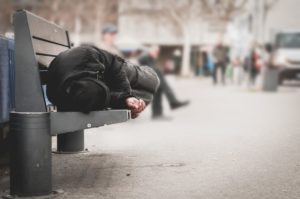An estimated .17% of the U.S. population is homeless, equal to about half a million people. The population of homeless and housing insecure people has reached epidemic proportions in parts of California and New York, with numbers rising in Oregon and the District of Columbia. Policy advocates and other researchers believe that one of the leading causes of homelessness in these areas is the fact that most residents spend a higher proportion of their income on rent or mortgage payments than in other regions. About 70% of the homeless are men, and African Americans and Native Americans make up a more substantial portion of the homeless population than other groups.
The homeless are at higher risk than the average population of being a victim of crime, suffering a mental health condition, and also struggling with substance use disorder or alcoholism. Despite popular misconceptions, addiction in the homeless is often a result of homelessness, not a cause of it.
What are the statistics on drug and alcohol use in the homeless population?
For many research and advocacy groups, obtaining recent and completely accurate data on substance use among the homeless is difficult to measure and quantify. But recent studies from the Substance Abuse and Mental Health Services Administration (SAMHSA) have found that about 38% of the homeless are dependent on alcohol, while a further 26% abuse drugs.
Compare that to the general population, where only about 15% of people above the age of 12 abuse drugs within a given year. The studies also uncovered that older homeless adults were more likely to abuse alcohol, while teens and homeless young people struggled more with drug addiction.
Why is there an epidemic of homelessness in the U.S.?
Studies have indicated that high housing costs are a significant cause of homelessness. Homeless populations are much higher in states where residents have to pay a more substantial portion of their income to house payments than the average U.S. citizen. When someone is in a precarious financial situation, any adverse circumstances can push them over the edge into a position where they can lose their home. Divorce, illness, and drug addiction can plunge someone already struggling to maintain a roof over their head into homelessness and poverty.
When did homelessness become an issue in the U.S.?
Homelessness and drug addiction did not become a national issue until the 1870s. The industrial revolution, rising inequality in the Gilded Age, and morphine addiction all contributed to the start of the country’s problems with homelessness.
What is the connection between homeless and drug addiction in the U.S.?
People who have never experienced housing insecurity or homelessness first-hand may believe that drug addiction or alcohol abuse precedes homelessness. But studies have found that this isn’t necessarily true. In most cases of addiction and homelessness, people became homeless before they became addicted to either drugs or alcohol. However, drug addiction can indeed be a catalyst for homelessness.
Drug addiction and alcohol abuse can destroy a person’s relationship with their loved ones and support network. Becoming addicted to a substance will completely take over a person’s life, and they will miss work or school and struggle with their finances. When someone is addicted, all they can think about is how to avoid withdrawals and get their next fix. Making a rent or mortgage payment often takes a backseat to obtain drugs or alcohol. People who already struggle to pay their bills are at higher risk of becoming homeless if they develop an addiction to drugs or alcohol, and substance abuse is one of the top three causes of homelessness for families.
Facing housing insecurity, violence, and stress that’s inevitable when someone becomes homeless can also trigger substance use or alcoholism in vulnerable individuals. The homeless face numerous barriers to obtaining the things they need to save enough money to get a house or an apartment. It’s challenging to find remunerative employment when one doesn’t have an address. A person needs substantially more money for a downpayment, or first month’s rent and a security deposit than they need for drugs.
Drugs or alcohol offer a person in a dire, stressful situation a quick escape from their pain and fears. Homeless individuals with a mental health disorder may find it easier to get relief from their symptoms with drugs or alcohol than it is for them to obtain mental health treatment. Peer pressure is also a factor in higher rates of addiction among the homeless. Many individuals may feel that using drugs or drinking is the only way to be accepted into the homeless community. But unfortunately, addiction only makes it harder for people to escape poverty and homelessness.
Achieving and maintaining sobriety is a complicated process for anyone, but it’s even more challenging for people who do not have access to safe, affordable housing. To quit using drugs, a person needs support, safety, and motivation to stop. For someone who is facing homelessness, daily survival can appear far more urgent than getting treatment for substance abuse.
Why are there such large numbers of homeless people in the U.S. using drugs?
For many homeless people, obtaining drugs or alcohol is more accessible than finding gainful employment and obtaining secure housing. On the street, drugs are more readily available than opportunities for the homeless to improve their situation. Couple an availability of drugs with the stress and anxiety that accompanies life as a homeless individual, and it makes sense that someone in that situation would turn to substances to cope. If someone was addicted to drugs before becoming homeless, being homeless makes it even harder for that individual to get necessary medical treatment.
If you or someone you love is struggling with drug or alcohol abuse, it’s critical to get help before things spiral out of control and cause irreversible damage to your health and finances. Please contact Mission Harbor Behavioral Health today. Representatives are standing by to answer your questions about rehab and addiction counseling.

